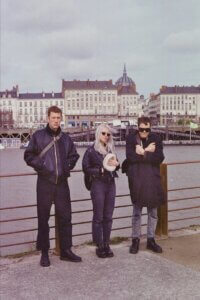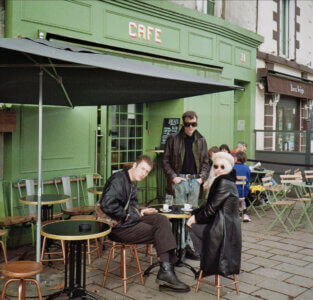FACS turn negatives into positives

Trying to find success with a new musical project after one you’d previously been known for ends can be difficult, but Chicago’s FACS have risen audaciously to the challenge. Following the disbandment of vocalist/guitarist Brian Case and drummer Noah Leger’s previous band Disappears, they’ve since joined forces with bassist Alianna Kalaba (replacing another former Disappears member Jonathan van Herik) and delivered a moody and hazily atmospheric debut album Negative Houses, released back in late March. We caught up with Case via email to get his thoughts on the transition period between bands; the past, present and future of FACS’ material, and kickass sax solos.
NT: What’s the origin of the new band name? Is it a play on the word “facts” or an acronym of something else? When I Google your band name, I get results about “fluorescence-activated cell sorting”.
BC: It’s a few things… Yes, “facts” is the genesis of where it came from. But we also liked it as short for “facsimile”, like we were doing the same thing we were before but with a new name. FAC is also the catalog prefix for Factory Records, which we liked as it was a nod to where we were coming from musically/artistically.
NT: What new challenges, musically or otherwise, has being in FACS given you since this new journey began that might not have been there with Disappears?
BC: Initially I switched to bass, which was a real adjustment. I’d pared down my guitar playing significantly over the last few years and thought the transition to bass would be pretty fluid, but it was tough. I had to learn how to sing in a new way and even how to move differently. It was way more of a shake up than I was anticipating, which was great. FACS is also a reminder of how hard it is to start over from scratch. We had some advantages having played together for so long with each other in terms of communication and knowing what direction we wanted to go in. But I feel like we did a real hard reset and went back to the beginning, which was frustrating on a lot of levels, but a great reminder of why we continue to do this.
NT: When Disappears broke up, you scrapped an album’s worth of songs. How many ideas for songs that had been conceived from those sessions seeped into this album, or may seep into future material?
BC: Only one song made it over from that – and even that song is pretty unrecognizable from how we were playing it with Disappears. That said, we definitely were using the same concepts and talking about music the same way with each other. I’m sure subconsciously we were channeling some of the same sources. I did keep all the lyrics I had written, though. I wasn’t working on a concept per se, but I did have this thing I wanted to see through and it was important to me that I got that out into the world.
NT: You guys initially played together over a span of six months without specific goals aside from simply making music. At what point during that span of time did it hit you where you thought “Oh wow, we’ve got a potential album on our hands”?
BC: Our first show was around that six month mark and we were pretty confident that we had almost a record’s worth of material. But we didn’t want to go in and record the first 10 songs we wrote or whatever, so we kicked a few things around, re wrote some stuff and threw some things away. By the time we’d done all that and written a few more songs, it was another six months, so we were recording about a year after we’d started new as FACS.
NT: You worked on this new album with John Congleton, who has also worked with your soon-to- be tourmates Suuns. What did he bring to this LP?
BC: He’s amazing. He’s been one of my best friends for almost 20 years, so he brings a lot when we work together. It’s a comfortable, creative space with a collaborator who knows where we’re coming from and what we want to do. We can throw anything at John and he’s got an opinion or an idea, and he’s very patient and relaxed. We made that record in six days, so it was really time sensitive but nothing was busy or rushed. We got into our world and he made sure that we stayed there. I’m looking forward to doing it again as soon as possible.
NT: You now have a new bassist, Alianna. How did you get acquainted with her? What are the first memories you have of jamming and making music with her?
BC: I met Alianna when I first moved to Chicago. She played in a amazing band called We Ragazzi. They made three records that are all worth tracking down, so so good. She’d been living between New York and San Francisco for the last decade or so but recently moved back to town. We actually met up on the last Disappears tour and talked about making music together when she came back to Chicago, which we ended up doing in a band that’s still getting going. When Jonathan quit, Noah and I had a few long talks about getting someone into the band that was the right person, not necessarily the most experienced bass player – we’d decided I’d move back to guitar. Alianna has been playing drums for two decades so we wanted to use that sense of rhythm as a jumping off point, and use the situation as a new way to approach what we were doing. I’d say within the first few practices we knew it was going to be a really good fit – she has great energy and presence, and she’s a pretty weird dancer.
NT: What led you to naming the album “Negative Houses”, and why?
BC: Negative Houses was my first suggestion for the band name, which was met with some indifference, but I was determined to get it in there somewhere. It’s the first line in the first song, which I thought was cool, and it’s a pretty open ended idea. It can mean a few things. I usually gravitate to things like that.
NT: That sax solo on “Houses Breathing”. Wow. How did the idea come about to include that in the song?
BC: I just heard it in my head – I’ve been wanting to use sax for years but never felt like there was room for it in Disappears. That song is so moody I knew it would work, and Nick [Mazzarella] was the perfect player for it. The guys were pretty skeptical, but once he laid it down they were convinced. So happy with how that whole song turned out.
NT: Apparently you’re already trying to figure out how to fit in recording another album before year’s end. What more can you tell us about that as of now?
BC: Writing wise we’re in a great place – we’ll be taking about half of the new album on the road with us this month to see how it works. I think it’s going to end up being pretty different from Negative Houses. We’re in the middle of it all right now, so it’s hard to say what it is yet, but there are moments we’re all asking each other “Can we do this?”, which I always think is a good thing. It feels really “new,” whatever that means. I’m excited. I want it to be more open than the last one. We’ve been talking about keeping it loose and not make it this big deal, like playing a show or something.
NT: What are you most proud of about this album, and what do you think someone who was a big Disappears fan will appreciate the most about it?
BC: I’m proud it exists. It can be hard to stay creative and focused as the weight of age and responsibility continues to get heavier and more real. We did exactly what we wanted, outside of the expectation or timeline of anyone else, and that was really refreshing and liberating. It’s hard to take a step back from things and see what you’re doing and why, but the whole process leading up to the release of Negative Houses was a good reminder of why making music is so important. Conceptually, I think anyone who liked Disappears will be able to get into this record. I wouldn’t say it’s a continuation of the path we were on, but it’s definitely coming from a similar place and has a similar swagger. Maybe they’ll appreciate the new perspective?
Interview by Dave Macintyre
Order FACS’ current release Negative Houses now available on limited edition gold pressed vinyl.
Latest Reviews
Tracks
Advertisement
Looking for something new to listen to?
Sign up to our all-new newsletter for top-notch reviews, news, videos and playlists.









